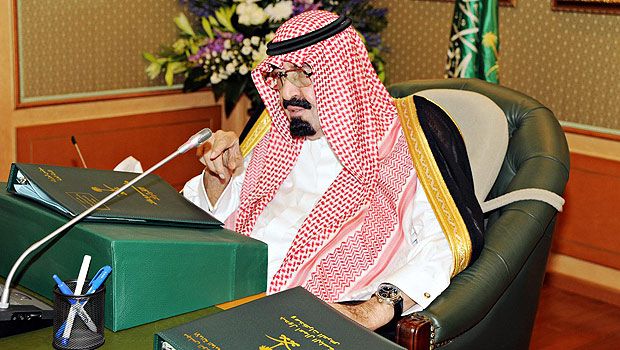
Riyadh, April 17: The Council of Ministers yesterday denounced as a flagrant violation of the UAE’s sovereignty the visit of Iranian President Mahmoud Ahmadinejad to the UAE island of Abu Musa, which is occupied by Iran.
The Cabinet, chaired by Custodian of the Two Holy Mosques King Abdullah, said Ahmadinejad's visit also invalidated the ongoing efforts to find a peaceful solution to the dispute through direct negotiations or taking the issue to the International Court of Justice.
Transport Minister and Acting Information Minister Jabara Al-Seraisry said the Cabinet meeting condemned last week’s terrorist attack in Bahrain that injured seven Bahraini policemen. It took place in the village of Akr, south of the capital Manama. Bahrain's public security chief Gen. Tareq Al-Hassan said an improvised bomb exploded last Monday (April 9) near a police checkpoint at the entrance to the village, "wounding seven policemen, three of them critically."
The Cabinet reiterated Saudi Arabia’s total support for Bahrain.
During the Cabinet meeting, King Abdullah briefed the ministers on the outcome of his talks with Turkish Prime Minister Recep Tayyip Erdogan and highlighted the deep-rooted Saudi-Turkish relations.
On other international issues, the Cabinet welcomed the decision taken by the UN Security Council on sending international observers to supervise a cease-fire in Syria.
“The Cabinet emphasized the need to stop the violence and end bloodbath of Syrian people,” Al-Seraisry said. The Kingdom also called for immediate steps to reach relief supplies including food and medicine to all Syrian victims. The first group of UN peacekeepers has arrived in Damascus to oversee the truce aimed at ending a year of bloodshed.
The Cabinet commended the resolutions taken by a forum for family issues at Shariah courts organized by the Justice Ministry, and endorsed an Arab agreement for combating information technology crimes. It also agreed to sign a memorandum of understanding on the conservation and management of dugongs and their habitats throughout the world.
The Cabinet appointed Saleh Al-Rasheed, director general of Saudi Industrial Property Authority (Modon), a member of the board of directors of Saudi Industrial Development Fund, in place of Commerce and Industry Minister Tawfiq Al-Rabiah.
It appointed Jamal bin Nasser Al-Molhem deputy mayor of Dammam for construction and projects; Sultan bin Ahmed Al-Sudairy assistant undersecretary for security affairs at Jazan governorate; Suleiman bin Abdullah Al-Tuwaijri director general of customs at King Fahd Causeway; Saad bin Muhammad Al-Sayari director of the office of the minister of communications and information technology; Aamir bin Abdul Mohsen Al-Dossari director general of the Commission for Promotion of Virtue and Prevention of Vice’s branch office in the Asir region; and Abdullah bin Ali Al-Quraishi director of financial affairs at the general secretariat of the Cabinet.






Comments
Add new comment